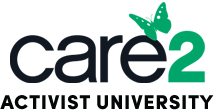Remind Yourself What is Real: Mental Health and Activism During a Post-Truth Era

Information is coming in at an accelerated pace and activists are working to respond to it immediately and yet with care. Even now as I write this I feel the urge to jump a screen over and check my newsfeed, the rate and gravity of the political climate feels like a crisis, and every person in this nation is feeling that vibration. Activists are engaging with it, which I commend, and as a mental health advocate I advise certain care is taken.
An activist — an active, vigorous advocate of a cause, especially a political cause — is a person who is organizing meetings, or quietly attending the meetings, making phone calls to Senators, staging walkouts, or writing an email. Because of the extreme divisiveness and unprecedented political corruption at this time, activism is present in many forms: rabble rousing and community organizing is just as important as quiet and subversive resistance.
Maintaining a healthy mind, body, and soul while engaging in activist work is essential — the very basic and oft turned to analogy of putting the oxygen mask on before you help the passenger next to you is absolutely accurate. In these times, the age of Trump’s administration, there are particular concerns and stressors that we must be attentive to in order to maintain our mental health and remain effective agents of change. The key to our health and power is our ability to tell what is real.
Activism
I am a clinical psychologist working with adults and adolescents in private practice, I also have a history of activism and in my practice treat several individuals who identify as activists. The good news is that an activist cares: an activist typically has been moved by a sense of compassion and justice. These are powerful emotions that raise adrenaline and activate the nervous system in an individual, giving the sense of purposefulness and urgency. Activism can feel good. To be involved in an activity for a cause has more meaning than our daily activities, engendering a sense of purpose. At times it feels like a high: walking with hundreds of people and shouting slogans in a march will give a person an adrenaline rush. Moreover, being a part of something bigger than your individual life or knowing your actions are effecting a greater sense of change in the world is empowering. For those who respond well to high stimulation, activism can be incredibly satisfying, like a national drama that one is partaking in. Ultimately, to be of service puts a pause on one’s own suffering. And yet, our individual psyches do not end as activism begins, we are still ever-present and must take great care to protect our mental health while taking part.
Because activism is typically motivated by strong feelings, activists also feel anger, rage, frustration, and resentment. These feelings tend to be very wearing on a person’s health, anger raises cortisol levels — the stress hormone — and adds stress to our nervous system, giving a feeling of being on edge or irritable, creating insomnia, and increasing addictive behaviors. Anger and disillusionment over the inability to get others on board what one views as a critically important moral mission can be devastating. Often this work gives way to fatigue and resignation, or what is referred to as activism fatigue or burnout.
Post-Truth
The Trump administration employs a strategy of gaslighting — telling lies, denying them, blaming others, projecting, creating confusion, etc. Using language and widespread broadcast (twitter), Trump attains control, confusion and power. The lies come from the mouths of people who we perceive as official, typically people seen as guardians of truth and reality. But that is not the case this time, and it is stressful for the mind to see one thing (empty spaces at the DC mall during the inauguration) and to hear another (Trump had the largest inauguration crowds in US history). It is disorienting and manipulative, we are forced to mentally resist the lies and seek the truth. Activism is a mental exercise we must perform upon receiving each new piece of information from the Trump administration. Combined with the rapid absorption of media, facebook, twitter and news feeds that come in simultaneously, one must be quite vigilant in the protection of their minds. Each tweet or press conference from the Trump administration — Trump, Conway, Spicer, etc — requires a critical filter that can pull apart the lies from the truth, the gaslighting from the reporting, and the provocations from the alerts, in order to not only receive but process the reality of the situation.
Additionally, the hostile content of what is being broadcast puts people on a state of panic. Alarming information like Iran is on notice, Mexico breaks ties, Canada stands up to Trump, China is stockpiling nuclear weapons, Muslims are detained, families are broken up, mosques are burning, hate crimes are surmounting, support an ever growing fear that the-end-of-life-as-we-know-it is inching closer. I had a smart college bound 18-year-old client in my office yesterday in wretched tears wondering if our country would be bombed before she could get to college. She told me about her cart on Amazon.com that she and her mother have filled with survival tools. These are very real fears in many people I talk to all day.
I told her to is go home and delete everything in her cart. We must pull away from the apocalyptic hysteria — it is a manipulative device. Trump uses shock to disorient us into inaction. This is particularly difficult for the younger generation — teenagers and twenty-somethings — to process. They are having a new experience of the world and not prepared for this vast corruption, they have no idea what will happen next.
What To Do: Take Refuge
Identifying, understanding and believing what is real is essential for a mind to stay grounded and healthy.
This is not as philosophically challenging as it may sound. Remind yourself what is real — what are the words you actually heard someone say, what did you eat for breakfast, what is the person next to you wearing — continue to return to what is true and it will provide you refuge.
Buddhists use the term ‘taking refuge’ to refer to the commitment one makes to the spiritual path of Buddhism, but I’m using it here both spiritually and psychologically: finding refuge or a place where you are safe, in your own familiar and reliable thoughts, feelings, beliefs and environment that you can trust. The quickest and best way to find refuge is by paying attention to your breath. Trauma victims use an exercise of local identification, when post-traumatic stress is triggered a client will identify things in the room, eg. I am sitting on a couch, the sun is coming in the window, the carpet is soft, the clock is ticking, the walls are light blue, etc. This can help ground a person’s mind in time and place so as to locate the psyche in reality, not in a traumatic event.
For the activist, that requires a few things: turn off the media for periods of time. Turn off notifications on your phone and when you are interested and ready, seek out information from reliable sources. Fear makes us want control and that means owning every new piece of news, but we do not need to be immersed to be informed. We do not need constant notifications to remind us we care deeply about what is happening. We will get the information we need. The psyche wants to be prepared with knowledge but it can become flooded with an excess and then shut down, becoming much less useful to us. Take breaks, focus on something you can control — like your breath, or a crossword puzzle; find something that the mind can master. When a person has an adrenaline rush there is always a crash, so after a march or a rally or a community meeting, one may need extra nurturance, warm food, and more sleep, to recover their nervous system.
When you are with people you trust, talk about real feelings, not just anger; discuss the fear and the hopes you have. And then talk about something else. You are no less an activist if you talk about La La Land instead of Citizen United.
Focus on what is close and dear to you — your pet, your favorite food, your church, a physical activity, natural beauty around you, people you love and trust. When you ground yourself in what you know to be real in this world, it will reset your heart, mind and soul so that you can use them again when facing the contradictions and hostility of the world. Ground your instincts, fill your senses with real things around you, the feel of your soft blanket, the smell of coffee, the sound of your music or laughter, the taste of your favorite pizza. Your secured instincts will help you move forward in your activism, because not only should other reliable resources always be consulted against Trump speak, but we must check in with our own instincts, our gut check, to know the integrity of the information.
Acting for a better world, in particularly a world that is currently hard to trust, can increase instances of post-traumatic stress disorder (PTSD), depression, and anxiety. Connect with your doctor or a therapist if you are feeling symptoms of stress, and keep up the fight.
Find a therapist here:
https://www.psychologytoday.com/
Dr. Brooke Laufer is an IL licensed clinical psychologist who has been working with people — providing therapy, family counseling, teaching, writing and consultation — for 15 years.

